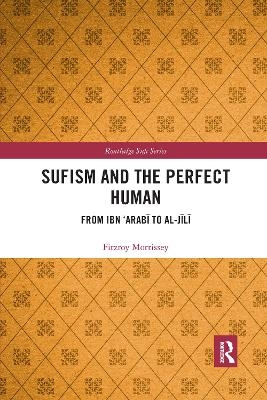
Sufism and the Perfect Human
From Ibn ‘Arabī to al-Jīlī
Seiten
2021
Routledge (Verlag)
978-1-032-17427-3 (ISBN)
Routledge (Verlag)
978-1-032-17427-3 (ISBN)
Studying the history of the notion of the ‘Perfect Human’, this book investigates a key idea in the history of Sufism. First discussed by Ibn ‘Arabī and later treated in greater depth by al-Jīlī, the idea left its mark on later Islamic mystical, metaphysical, and political thought, from North Africa to Southeast Asia, up until modern times.
Studying the history of the notion of the ‘Perfect Human’ (al-insān al-kāmil), this book investigates a key idea in the history of Sufism. First discussed by Ibn ‘Arabī and later treated in greater depth by al-Jīlī, the idea left its mark on later Islamic mystical, metaphysical, and political thought, from North Africa to Southeast Asia, up until modern times.
The research tells the story of the development of that idea from Ibn ‘Arabī to al-Jīlī and beyond. It does so through a thematic study, based on close reading of primary sources in Arabic and Persian, of the key elements of the idea, including the idea that the Perfect Human is a locus of divine manifestation (maẓhar), the concept of the ‘Pole’ (quṭb) and the ‘Muhammadan Reality’ (al-ḥaqīqah al-Muhammadiyyah), and the identity of the Perfect Human. By setting the work of al-Jīlī against the background of earlier Ibn ‘Arabian treatments of the idea, it demonstrates that al-Jīlī took the idea of the Perfect Human in several new directions, with major consequences for how the Prophet Muhammad – the archetypal Perfect Human – was viewed in later Islamic thought.
Introducing readers to the key Sufi idea of the Perfect Human (al-insān al-kāmil), this volume will be of interest to scholars and students interested in Sufism, Islam, religion and philosophy.
Studying the history of the notion of the ‘Perfect Human’ (al-insān al-kāmil), this book investigates a key idea in the history of Sufism. First discussed by Ibn ‘Arabī and later treated in greater depth by al-Jīlī, the idea left its mark on later Islamic mystical, metaphysical, and political thought, from North Africa to Southeast Asia, up until modern times.
The research tells the story of the development of that idea from Ibn ‘Arabī to al-Jīlī and beyond. It does so through a thematic study, based on close reading of primary sources in Arabic and Persian, of the key elements of the idea, including the idea that the Perfect Human is a locus of divine manifestation (maẓhar), the concept of the ‘Pole’ (quṭb) and the ‘Muhammadan Reality’ (al-ḥaqīqah al-Muhammadiyyah), and the identity of the Perfect Human. By setting the work of al-Jīlī against the background of earlier Ibn ‘Arabian treatments of the idea, it demonstrates that al-Jīlī took the idea of the Perfect Human in several new directions, with major consequences for how the Prophet Muhammad – the archetypal Perfect Human – was viewed in later Islamic thought.
Introducing readers to the key Sufi idea of the Perfect Human (al-insān al-kāmil), this volume will be of interest to scholars and students interested in Sufism, Islam, religion and philosophy.
Fitzroy Morrissey is an Examination Fellow of All Souls College, Oxford. He researches and teaches the intellectual and religious history of the Islamic world in the medieval and modern periods. Previously the co-author of Iran: Persia: Ancient & Modern (2016), and the recipient of a DPhil in Oriental Studies at the University of Oxford (2018), this is his first specialist book.
Introduction Part One: Al-Jīlī’s Life & Thought 1. Al-Jīlī’s Life & Work 2. Al-Jīlī’s Sufi Metaphysics Part Two: The Perfect Human 3. A ‘Synthetic Being’: The Perfect Human as Locus of Divine Manifestation and Microcosm 4. The Pole 5. The Muhammadan Reality 6. The Identity of the Perfect Human Conclusion: Influences and Impact
| Erscheinungsdatum | 01.10.2021 |
|---|---|
| Reihe/Serie | Routledge Sufi Series |
| Verlagsort | London |
| Sprache | englisch |
| Maße | 156 x 234 mm |
| Gewicht | 660 g |
| Themenwelt | Geisteswissenschaften ► Religion / Theologie ► Islam |
| ISBN-10 | 1-032-17427-7 / 1032174277 |
| ISBN-13 | 978-1-032-17427-3 / 9781032174273 |
| Zustand | Neuware |
| Haben Sie eine Frage zum Produkt? |
Mehr entdecken
aus dem Bereich
aus dem Bereich


